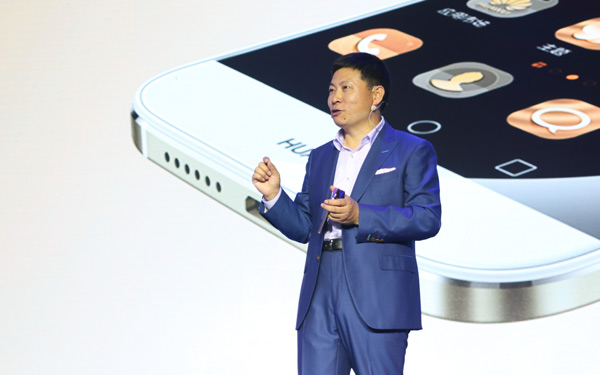 |
|
Yu Chengdong, chief executive officer of Huawei Consumer Business Group, at the launch of Huawei Mate 8 which is powered by self-made Kirin 950 chip in Shanghai.[Photo/China Daily] |
Home-grown firms seek to develop their own mobile processors and operating systems
One of the positive outcomes of the government's decision to support local innovation is that many Chinese firms have announced plans to make their own chips and software products for mobile devices.
Chinese firms, it seems, are intent on gaining market share in these areas where they have been lagging for long.
The development follows Chinese tech majors' taking of nearly 80 percent share of the country's smartphone market.
Telecom equipment maker Huawei Technologies Co Ltd, which is also China's biggest smartphone vendor by shipments, is the staunchest advocate of made-in-China chips.
Huawei has already used a home-made processor, the Kirin 950, in its latest flagship device Mate 8, a 3,000-yuan smartphone which is trying to take on the iPhone 6S and Samsung Electronics Co's Galaxy series.
In November, Kirin 950 was one of the hottest topics at the Mate 8 launch. "The processing power of Mate 8 will make other vendors' devices look weak," said Yu Chengdong, head of Huawei's consumer division.
Kirin 950 was produced by HiSilicon Technologies Co Ltd, a chipmaking subsidiary of Huawei. The long-awaited chip received the market's thumbs-up because of its processing speed and power-efficient design.
But Huawei is looking for more than positive reviews. The company hopes the Kirin series will become a top contender in the mobile chip market, challenging Qualcomm Inc of the United States and MediaTek Inc of Taiwan, which dominate the market now.
Qualcomm has been the biggest high-end mobile chip supplier to Chinese handset makers, including Xiaomi Corp and Lenovo Group Ltd. MediaTek used to focus on the lower-end market, but it, too, has begun producing chipsets for high-end devices.
The two giants accounted for about 60 percent share of Android devices in 2015, according to AnTuTu, a smartphone performance review company.
HiSilicon, whose biggest customer was its parent Huawei, had a 7.73 percent share of the chip market in 2015, said AnTuTu, adding the corresponding figure for 2014 was less than 3 percent.
Besides Qualcomm and MediaTek, two other foreign chip-makers are prominent in China: Samsung and Intel.
The rapid growth in HiSilicon's market share was because of the high level of shipments of Huawei's premium devices, AnTuTu said in a report.
In the July-September quarter, Huawei emerged the biggest smartphone vendor in China overtaking Xiaomi, according to research firm Canalys. The Shenzhen, Guangdong-based Huawei registered 81-percent year-on-year growth in shipments, while Xiaomi's shipments shrank, Canalys said.
Information security concerns will likely give Chinese-made chips a bigger room in 2016.
Which is why, Spreadtrum Communications Inc, a chip-maker under the State-owned phones have the power (to hold personal data, shape opinions and publish views), it is not safe (to have foreign-made chips in them). That is why, we have to develop our own chipsets."
The Chinese company has plans to spend 300 billion yuan ($46.4 billion) in the next five years to become the world's third-largest chipmaker.
Ye Tianchun, director of the Institute of Microelectronics, which is under the aegis of the Chinese Academy of Sciences, said Chinese chip-making industry is growing its presence in the global market fast as China has announced plans to boost technology upgradation.
"Chip-making is a critical technology for many areas, including smartphones. China is set to grow a strong chip sector, so we don't need to beg other countries for key chipsets," Ye said.
